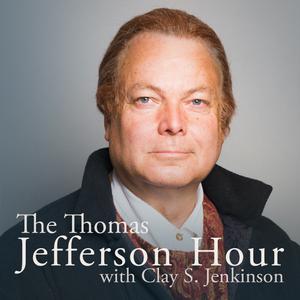
For the Ages: A History Podcast
New-York Historical Society
Explore the rich and complex history of the United States and beyond. Produced by the New-York Historical Society, host David M. Rubenstein engages the nation’s foremost historians and creative thinkers on a wide range of topics, including presidential biography, the nation’s founding, and the people who have shaped the American story. Learn more at nyhistory.org.
- 27 minutes 2 secondsLatinoLand: A Portrait of America's Largest and Least Understood Minority
Today, Latinos represent 20% of the US population, with census reports projecting that one-third of Americans will identify as having Latino heritage by 2050. Exploring the complex history of immigration across the Americas, demographic diversity within US borders, and the impact on US politics, inaugural literary director of the Library of Congress Marie Arana joins David M. Rubenstein to discuss this extremely diverse set of Americans, with a focus on the broad range of racial, political, and historical backgrounds of the nation’s fastest growing minority group.
Recorded on May 30, 2023.15 May 2024, 8:00 pm - 27 minutes 13 secondsBecoming FDR: The Personal Crisis That Made a President
In popular memory, Franklin Delano Roosevelt was the quintessential political “natural.” However journalist and author Jonathan Darman argues that this political acumen was the hard-earned result of Roosevelt’s seven-year journey through illness and recovery from polio. In that decade of adapting to the stark new reality of his life, he discovered how to find hope in a seemingly hopeless situation—a skill that he employed to motivate Americans through the Great Depression and World War II. In conversation with David M. Rubenstein, Darman underscores the link between Roosevelt’s struggles with polio and his growth as both a man and leader, drawing attention to the shrewdness and compassion that made Roosevelt so effective.
Recorded on March 28, 20236 May 2024, 4:00 am - 27 minutes 14 secondsIn the Shadow of Slavery: African Americans in New York City, 1626–1863
In 1991, a crew of New York City construction workers found the remains of a massive burial ground under twenty feet of rubble, just blocks from City Hall. The forgotten cemetery contained the remains of as many as 20,000 African Americans, and pointed to the countless untold stories of the enslaved and free people who lived, labored, and died in New York. Historian Leslie M. Harris joins David M. Rubenstein to shine a light on these stories, tracing the early African American experience in New York from the arrival of the first slaves into the city in 1629 to the devastating racial violence of the New York City Draft Riots in 1863.
Recorded on April 10, 202329 April 2024, 4:00 am - 27 minutes 6 secondsThe Song of the Cell: An Exploration of Medicine and the New Human
The discovery of the cell in the 17th century caused a paradigm shift in medicine, with the human body coming to be seen as something never before imagined: an ecosystem in and of itself; a collection of innumerable organic parts working in tandem to fulfill our biological functions. Physician and Pulitzer Prize-winning author Siddhartha Mukherjee sits down with David M. Rubenstein to explore how this watershed moment came about and how its effects are still playing out in the form of radical medical advancements that draw into sharper relief what it means to be human.
Recorded on December 13, 202222 April 2024, 4:00 am - 31 minutes 34 secondsHow the Best Did It: Leadership Lessons from Our Top Presidents
Throughout history, Americans have looked to their president for guidance, seeking leadership from the nation’s highest office during times of turbulence. Historian and lawyer Talmage Boston speaks with David M. Rubenstein to discuss the leadership lessons that can be learned from America’s most effective presidents—from Washington’s precipitous rise to power to Reagan’s ability to motivate and inspire optimism—and how they can be instructive to today’s leaders.
Recorded on February 12, 202414 April 2024, 4:00 am - 27 minutes 9 secondsG-Man: J. Edgar Hoover and the Making of the American Century
J. Edgar Hoover was not only the inaugural director of the FBI, but the architect of modern American law enforcement. Hoover’s stewardship over America’s justice system was as robust as it was ruthless, while his connections to white supremacists and the religious right spun a complex web between policing, politics, and race. Historian Beverly Gage sits down with David M. Rubenstein to discuss her Pulitzer Prize-winning book on Hoover, tracing the lawman’s decades-long career shaping the American legal and political landscape, a period of immense influence that would span eight presidencies.
Recorded on March 8, 20238 April 2024, 4:00 am - 31 minutes 6 secondsHitler’s American Gamble: Pearl Harbor and Germany’s March to Global War
In December 1941, Nazi Germany controlled much of Europe, Japan was fighting a brutal campaign in China, and the United States had yet to enter into combat on either front. The attack on Pearl Harbor on December 7, however, changed everything. Historians Brendan Simms and Charlie Laderman join moderator David M. Rubenstein to dissect the five crucial days between the attack on Pearl Harbor and Nazi Germany’s declaration of war on the United States, tracing the strategic decisions that would irrevocably change the course of the Second World War.
Recorded on July 31, 202325 March 2024, 4:00 am - 38 minutes 29 secondsRiver of the Gods: Genius, Courage, and Betrayal in the Search for the Source of the Nile
In an exhilarating and, at times, harrowing account of exploration, survival, and betrayal, author and journalist Candice Millard joins David M. Rubenstein to discuss the story of two men’s search for the headwaters of the Nile River. Richard Burton, an intelligent, highly capable, and decorated soldier, and John Speke, an ambitious aristocrat and army officer, embarked on the treacherous journey together, soon developing a heated rivalry that would persist throughout their lives. Alongside them on their epic journey was Sidi Mubarak Bombay, a peerless guide who was formerly enslaved, and who played a vital role in this story.
Recorded on August 31, 202318 March 2024, 4:00 am - 24 minutes 19 secondsElizabeth Taylor: The Grit & Glamour of an Icon, Part Two
Author and journalist Kate Andersen Brower rejoins David M. Rubenstein to continue their conversation on the legacy of the great Elizabeth Taylor. Taylor’s triumphs––her precocious rise to megastardom, her fight for fair and equal pay despite the sexism present in Hollywood during her lifetime, her advocacy for those with HIV/AIDS––as well as the difficulties she faced in her life––her eight marriages and her struggles with addiction––are all brought into clearer focus in service of painting a rich portrait of the American icon.
Recorded on March 24, 202311 March 2024, 4:00 am - 31 minutes 40 secondsElizabeth Taylor: The Grit & Glamour of an Icon, Part One
Elizabeth Taylor, a legend of cinema known across the world, was one of the last great Classical Hollywood stars whose talent and beauty led her to universal renown. Beyond the artist, though, Taylor was a feminist trailblazer, a human rights advocate, and a fighter—someone who championed the needs of others and struggled bravely against problems of her own. Author and journalist Kate Andersen Bower joins David M. Rubenstein to delve into the first ever authorized biography of the twentieth century’s most famous movie star, bringing a new look at the life and legacy of Elizabeth Taylor.
Recorded on March 24, 20234 March 2024, 5:00 am - 37 minutes 5 secondsCreating a Confederate Kentucky: The Lost Cause and Civil War Memory in a Border State
Kentucky fought alongside the Union for the entirety of the Civil War, yet in the decades that followed, the state embraced many political and cultural traditions of the Confederacy, enacting Jim Crow laws and erecting monuments to embrace this adopted identity. In a fascinating conversation on identity and political myth-making, historian Anne E. Marshall breaks down how and why Kentuckians constructed this historically-revisionist narrative that shaped the trajectory of their state for the next 60 years.
Recorded on August 23, 202326 February 2024, 5:00 am - More Episodes? Get the App
Your feedback is valuable to us. Should you encounter any bugs, glitches, lack of functionality or other problems, please email us on [email protected] or join Moon.FM Telegram Group where you can talk directly to the dev team who are happy to answer any queries.
 Booknotes+
Booknotes+
 The Gilded Gentleman
The Gilded Gentleman
 The Thomas Jefferson Hour
The Thomas Jefferson Hour
 The Bowery Boys: New York City History
The Bowery Boys: New York City History
 Lectures in History
Lectures in History
 Ben Franklin's World
Ben Franklin's World